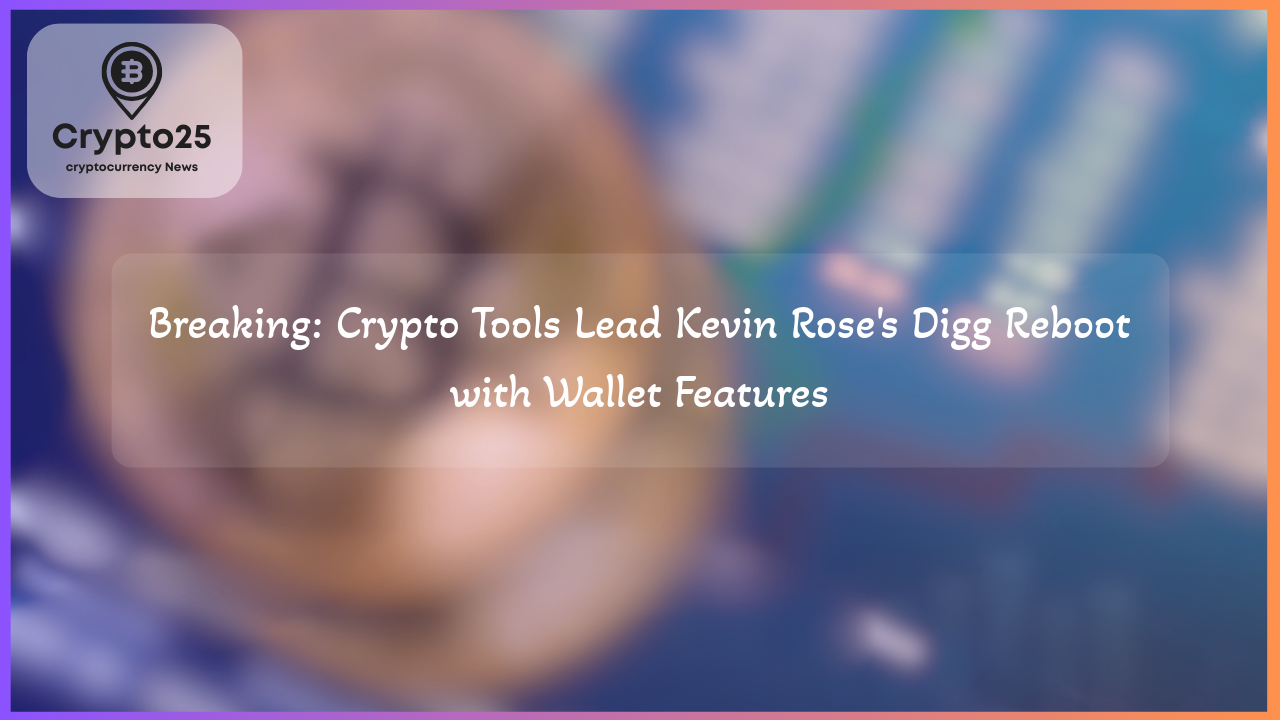
The resurgence of Digg, the once-popular social news platform co-founded by Kevin Rose, is making headlines in 2025 with a unique twist: its integration of crypto technology. Leveraging Privy—a Web3 solution known for simplifying wallet creation—Digg aims to set a new standard for user authentication and engagement. Let’s delve deeper into Digg’s crypto-driven comeback and its innovative approach to merging traditional tech with blockchain.
### The Role of Crypto Technology in Digg’s Revival
Kevin Rose recently announced the return of Digg, employing Privy’s embedded wallet technology as a key feature of the platform. Privy stands out in the Web3 ecosystem as a user-friendly solution, requiring only an email address to generate a crypto wallet. This simplicity eliminates the need for complicated seed phrases, breaking down significant barriers to blockchain adoption. Used by major Web3 platforms like OpenSea and Pump.fun, Privy’s role in Digg underscores how crypto is becoming an integral part of mainstream tech platforms.
According to Rose, Privy offers both traditional and blockchain-based authentication options, ensuring flexibility for Digg’s user base. This hybrid approach is essential as the platform positions itself at the intersection of Web2 and Web3. By integrating embedded wallets from day one, Digg opens the door to leveraging token-powered incentives, attestation systems, and transparent AI interactions—all hallmarks of the emerging decentralized web.
Digg’s revival is further bolstered by its founder’s collaboration with Alexis Ohanian, the Reddit co-founder and a well-known crypto advocate. Together, Rose and Ohanian aim to create a platform that rewards users for valuable contributions, a model that aligns seamlessly with blockchain-based reward mechanisms.
### Why Privy and Blockchain are Vital for Digg
The decision to embed blockchain technology into Digg is not just a marketing ploy; it aligns with the long-term vision of decentralization and user empowerment. Kevin Rose, in communication with early contributors through the community engagement platform Circle, stated that the use of wallets enhances trust and transparency on digital platforms. By granting users ownership of their contributions through crypto wallets, Digg tackles persistent issues in content creation such as attribution and rewards.
The emphasis on crypto wallet integration could redefine the social news landscape. Blockchain enables platforms like Digg to tokenize user actions, rewarding high-quality content with digital assets. In the words of Justin Mezzell, Digg’s CEO, fostering “positive and impactful contributions” is a central challenge, but tokenization provides a tested solution in the Web3 space.
With experience in the crypto world through Proof, Rose and Mezzell bring proven expertise to the table. Back in 2022, Proof’s Ethereum-based NFT collection, Moonbirds, skyrocketed in popularity with high sales. Digg’s leadership team has now transitioned from NFTs to broader Web3 applications, signaling the maturation of crypto innovations beyond tokenized art.
### The Broader Implications of Digg’s Web3 Integration
Digg’s use of Privy and its potential tokenized reward system point to a larger trend: the fusion of crypto and mainstream platforms. Blockchain is no longer confined to niche markets like cryptocurrency exchanges or NFT marketplaces. Platforms like Digg are illustrating that blockchain solutions can enhance user trust, incentivize positive behavior, and create sustainable engagement models.
Moreover, Digg’s return is emblematic of how crypto-savvy entrepreneurs like Rose and Mezzell are pivoting away from purely speculative projects to applications with real-world utility. This evolution is timely, given the scrutiny some crypto ventures face for over-promising and under-delivering. Proof, a venture previously led by Digg’s team, faced backlash despite raising $60 million, as it struggled to meet community expectations.
The partnership between Rose and Ohanian adds an extra layer of credibility to Digg’s relaunch. Ohanian, through his venture capital firm Seven Seven Six, plays a role not only in funding but also in ideating crypto integrations. This collaboration demonstrates a shift in the venture capital approach toward emphasizing blockchain for its ability to disrupt traditional business models.
| Aspect | Details |
|---|---|
| Market Cap of Web3 | $1.2 Trillion |
| Platform | Digg |
| Primary Blockchain Solution | Privy |
### The Future of Digg and Web3 Social Platforms
As the digital landscape becomes ever more decentralized, Digg’s crypto connection could redefine the way people interact with social news platforms. Leveraging Privy’s embedded wallets and adopting token incentives sets the stage for a user-centric and blockchain-powered Web3 era. The legacy of platforms like Digg, combined with emerging technology pillars like crypto wallets and reward systems, could reshape online content moderation and creator compensation models.
With Kevin Rose and Alexis Ohanian at the helm, Digg’s return reflects the growing symbiosis between Web2 giants and Web3 technologies. Whether it’s using AI for transparent moderation or rewarding user engagement with crypto tokens, Digg is positioning itself as a trailblazer in a new age of decentralized digital platforms. Rose’s assurance of continuous updates and refinements hints at a highly adaptable future for Digg, as it seeks to bridge the gap between conventional tech ecosystems and the world of blockchain innovations.
